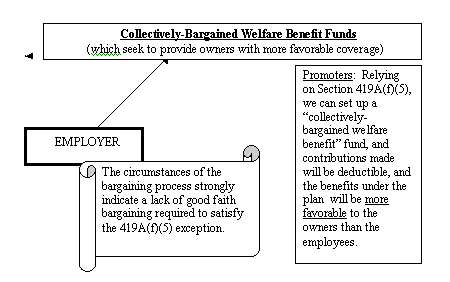LISTED TRANSACTIONS
This is custom heading element
Abusive Collectively-Bargained Welfare Benefit Funds
Exempted from IRC Section 419/419A Limits
IRS Notice 2003-24

The IRS issued this notice to warn business owners about arrangements that purportedly allow for their business to take a current income tax deduction for contributions made to a certain welfare benefit plan that purports to be “collectively-bargained.” Usually, these businesses have had no involvement with labor organizations or other aspects of the collective bargaining process. Yet, the promoters of these plans rely on the literal language of Section 419A(f)(5) to claim that the arrangements they have created comply with the literal requirements of this section. Typically, the promoter arranges for a management group to act on the business’s behalf in bargaining with an employee representative over benefits to be provided to all employees (including the owners). While the name of the management group may include the word “union,” the employee representative is often established specifically for the purpose of the welfare benefit arrangement being promoted (or the employee representative may be affiliated with an established union).
According to the IRS notice, these arrangements are characterized by large employer contributions relative to the amount actually needed to provide current coverage. The benefits expected to be provided to employee/owners are more favorable than the benefits provided to employees who are not owners. In some arrangements, participants can access funds by obtaining loans from the trust. While loans are supposed to be made available only for unanticipated events, in reality, most owners will be able to obtain a loan without regard to whether those events occur.
The IRS notes that the fact that a trust used to provide benefits under one of these arrangements may have received a determination letter from the IRS stating that the trust is exempt under Section 501(c)(9) of the Code. This is not determinative of the tax deductibility of contributions made to any such trust, nor does it determine the taxation of benefits provided through the fund to the participants.
A purported collectively-bargained welfare benefit plan is only a “listed transaction” if, in any year, the employer’s contributions with respect to any owner or owners of the employer, considered, in full, are more than ½ of the employer’s total contributions and there is at least one owner with respect to whom the employer’s contributions exceed $20,000. Also, any arrangement providing more favorable coverage for an owner of an employer than for non-owner employees is a listed transaction. Examples include an arrangement providing death benefits based on a uniform multiple of compensation, if it can be expected that the owner will obtain other benefits not otherwise available on the same basis to other employees. Additional examples of favorable coverage violating the spirit of the 419A rules include an arrangement allowing loans to participants under which it can be expected that an owner will be able to obtain the loans more readily, or on better terms, than other employees. Also, an arrangement violates this standard if it provides benefits only to participants who have completed a specified number of years of service with the employer, if it can be expected that one or more owners will be the only employees to satisfy the years-of-service requirement. Regulations anticipated under Section 419A(f)(5) will address the “separate fund” requirement.
If you believe that you may have engaged in a transaction that is the same or substantially similar to the transaction described above, Federal law may require you to disclose your and other parties’ participation in any such “listed transaction” on IRS Form 8886. For more information about Federal law requirements, please contact us.